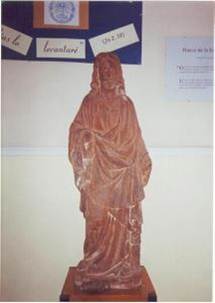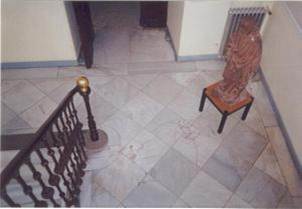On July 20, 1936, the socialist and communist youth took to the streets of Madrid and set about destroying churches and convents. This gave the signal to the militants in Pozuelo to so the same, and they attacked the chapel and the parish church and brought out to the streets the statues, images and sacred vestments and set them on fire at the same time as setting the buildings alight.
On July 22, at three in the afternoon, a group of militants, armed with rifles and guns, attacked the scholasticate. They rounded up the 38 Oblates forced them all into a room where they were kept at gunpoint. The rudeness and nervous disorganization of the militia made the Oblates believe that they were all about to be killed.
From the moment we were arrested (when they held us at gun point, face to the wall), we each had the thought in mind of being killed because we were religious. Within us, the only thing that arose was a spirit of forgiveness on the one hand, and on the other, a desire to offer our lives for the Church, for peace in Spain and for those who we thought were going to shoot us. The only motive that guided us was supernatural, since humanly speaking, we had lost everything. We knew that if they killed us, it was out of hatred for the Christian faith.
Fr. Felipe Diez, one of the Oblates who survived the ordeal
In the meantime the militia ransacked the house, looking for hidden weapons. All that they found were religious objects. From the top of the stairs they threw them down to be destroyed in the fire that was burning outside in the street. Today the crack on the floor caused by a statue of Jesus is still obvious.  They tried to smash the statue, but all that broke were the hands. They tried to burn it, but did not succeed because it has metal in it. Today that same statue continues to welcome all visitors to the Oblate house in Pozuelo – with its powerful message.
They tried to smash the statue, but all that broke were the hands. They tried to burn it, but did not succeed because it has metal in it. Today that same statue continues to welcome all visitors to the Oblate house in Pozuelo – with its powerful message.
Can anything cut us off from the love of Christ — can hardships or distress, or persecution, or lack of food and clothing, or threats or violence…? No; we come through all these things triumphantly victorious, by the power of him who loved us. (Romans 8: 35 and 37)
It is a reminder of Saint Eugene’s legacy that had marked his life and spirit from that moment that changed his life one Good Friday when, at 25 years of age, he had understood the meaning and the call of the the Saviour’s love, which nothing can overcome – as did the Spanish Oblates in their dark hour:
What more glorious occupation than to act in everything and for everything only for God, to love him above all else, to love him all the more as one who has loved him too late.
Eugene de Mazenod


Frank….when I first heard the reading out of their names in the necrology
of the Spanish martyrs as a novice in 1959!!! I was immediately taken with the fact that for the most part, we were of the same age. Would I have the courage to face death as they did? You could correct this, but I imagine they were non-political, perhaps even naive about the dangers. I was telling a friend about this event, and he wondered if the atmosphere of revenge was so high that a local republican could have exacted revenge by encouragement to others, because possibly a member of his family was killed by the Franco forces. All of this is speculation, but the times were horrific with atrocities on both sides.
Nevertheless, I truly pray that the event of the beatification be a great cause for celebration throughout the Oblate world this coming Saturday. (I wonder if we still place our light under a bushel basket!)